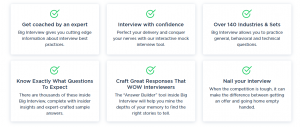practice for job interviews
The old adage, “Practice makes perfect,” definitely holds true for job interviews. A successful interview is a dynamic exchange of information and ideas between two people, which can only happen when both parties are well prepared. Interviewers want to see candidates with poise, basic social skills, and the ability to communicate effectively. Candidates expect to be challenged by questions that are relevant to the job and company.
If you are a candidate, practicing with a friend or family member will help you become familiar with the types of questions you might be asked and how to best answer them. However, you should also seek out a professional interview coach to get objective and constructive feedback that will be more beneficial than a simple recitation of your answers. A professional interview coach can provide you with insights into what employers are looking for in a good hire, as well as techniques to improve your performance and comfort level in the interview.
For your mock Job Interview Practice, try to replicate the environment that you would be in for an actual job interview. Dress in the type of attire you would wear to the interview and sit where you will be doing your actual job interview (if possible). If you’re doing a virtual interview, note any background noise or distractions. Then practice greeting the interviewer with a smile and a firm handshake, as well as making eye contact. It’s important to be as prepared for the interview as the employer will be.
Website design By BotEap.com
How can you practice for job interviews?
Interviewers typically ask a mix of questions, ranging from standard ones to behavioral or situational queries. While it’s impossible to prepare for every question, you should be ready with a list of your main talking points and how they can be applied to any situation. This will make it easy to adapt your responses as necessary.
It’s a good idea to research the company ahead of time, which will give you a better understanding of what the job is about and what qualifications are needed for success. You’ll be able to provide thoughtful and interesting answers to questions about the company, its history, culture, and current challenges. In addition, it shows the interviewer that you have an interest in the company and are eager to learn more about it.
Be prepared to discuss your salary expectations, as well. If you have researched the range of salaries for the position, it will be easier to come up with a number that is both reasonable and competitive.
It’s important to end the interview on a positive note by thanking the candidate for his or her time and letting them know when the hiring decision will be made or if a second interview will be scheduled. Interviewers should also be mindful of the unconscious biases they may develop, such as viewing a messy countertop or having pets in the room. These issues can be distracting and should not be used to determine a candidate’s ability to perform the job.